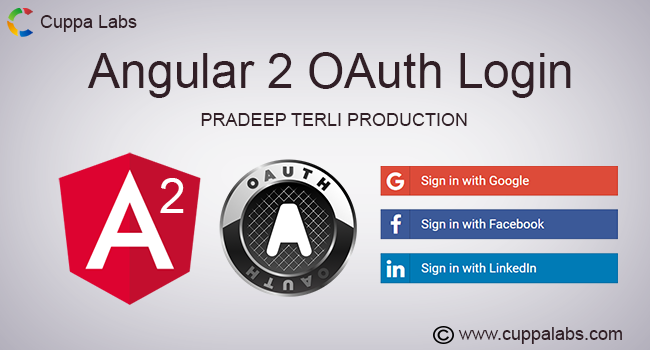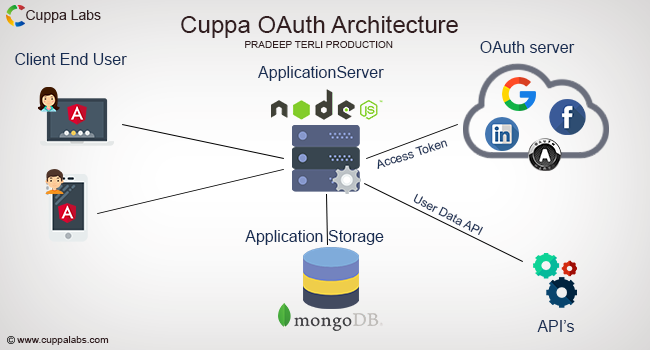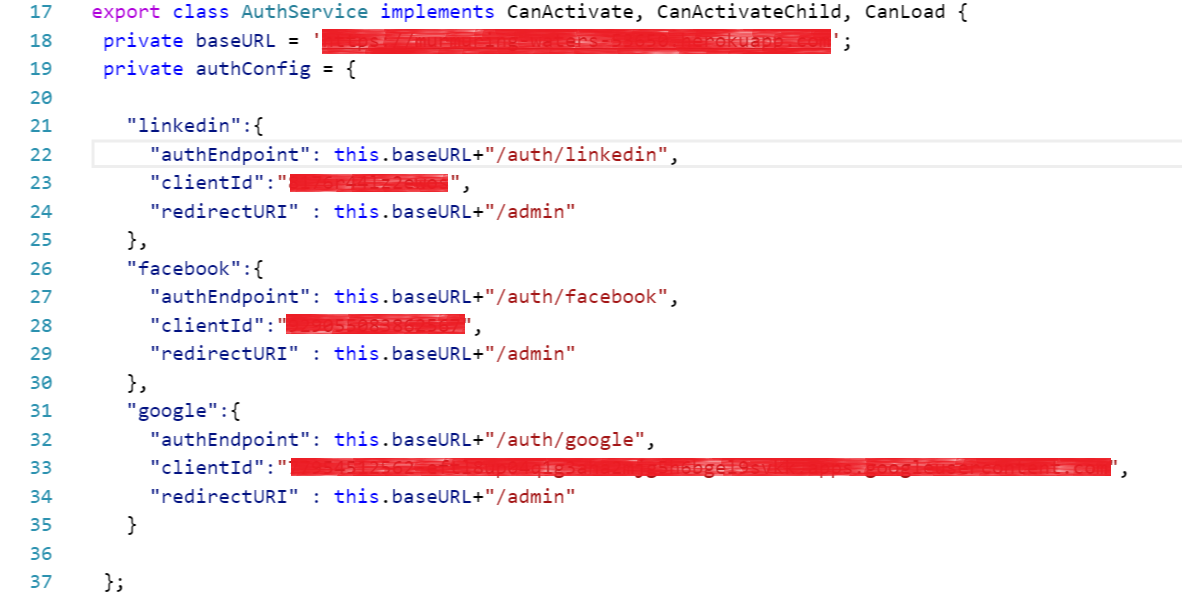
Research
Security News
Lazarus Strikes npm Again with New Wave of Malicious Packages
The Socket Research Team has discovered six new malicious npm packages linked to North Korea’s Lazarus Group, designed to steal credentials and deploy backdoors.
cuppa-angular2-oauth
Advanced tools
A light weight angular 2 , nodejs, mongo DB social login for facebook, google and linkedin.
It is often required that, a user register's or sign up to login to a particular website or application. It is a tedious job to fill those long forms with user basic details. To avoid filling long forms, Cuppa Angular 2 OAuth provides a module to login using social OAuth services like google OAtuh, Facebook OAuth and LinkedIn OAuth. Using this your application will be able to recieve basic details of the user from social networking sites and you can store in your application environment.


To get started using the Cuppa OAuth Social Login, the following pre requisites needs to be met with.
Knowledge of Angular 2 and latest Angular 2 version. Refer Setup AngularJS
Knowledge of NodeJS and latest version installed in your environment. Refer Setup NodeJS
Installed MongoDB and knowledge of setting up. Refer Setup MongoDB
Set up Angular Client, App Server(your node server), Mongo DB.
Follow the steps to install the Cuppa OAuthcode in your environment.
Clone https://github.com/CuppaLabs/angular2-social-login.git repository from github.
$ npm install - To install all the dependencies
$ npm run auth-server - To start the server (Run only when the entire application is setup).
Angular Configuration
To configure angular, the urls need to be changed to your environment url endpoints.
Go to src/app/auth.service.ts
Replace the baseURL with your endpoint(http://localhost:500, to run locally), as shown in the below snippet
Create your social app with Google/Facebook/LinkedIn and get you client ID
Replace the Client ID in the authConfig Object as shown below in the snippet.(blurred area)
redirectURI - the redirect url configured in the social networking app which redirects to your page on that URL, on successful login
authEndpoint - Your application server endpoint where it hits for authentication.

To configure Node Server, follow the below steps
Go to /auth-config.js
Create your social app with Google/Facebook/LinkedIn and get the client secret.
Replace the client secret with your app's client secret as show in the below snippet. (Blurred my credentials). Place your credentials there.

To configure Node Server with mongo DB details, follow the below steps
Install Mongo DB locally and start or deploy on any cloud platform
Go to /auth-config.js
Replace the username, password, mongo url and DB name. Form the url as follows and replcae as shown in the below snippet.

Ahh !!! Now you are ready to make your app up and running.
Start MongoDB Server
$ npm run build
$ npm run auth-server
Visit http://localhost:5000 to access your app running in your local. This should be the baseURL you configured in the angular configuration section. Deploy to your application server or any cloud platform.
This project is licensed under the MIT license. See the LICENSE file for more info.
--
The MIT License (MIT) Copyright (c) 2016 Cuppa Labs
Permission is hereby granted, free of charge, to any person obtaining a copy of this software and associated documentation files (the "Software"), to deal in the Software without restriction, including without limitation the rights to use, copy, modify, merge, publish, distribute, sublicense, and/or sell copies of the Software, and to permit persons to whom the Software is furnished to do so, subject to the following conditions:
The above copyright notice and this permission notice shall be included in all copies or substantial portions of the Software.
THE SOFTWARE IS PROVIDED "AS IS", WITHOUT WARRANTY OF ANY KIND, EXPRESS OR IMPLIED, INCLUDING BUT NOT LIMITED TO THE WARRANTIES OF MERCHANTABILITY, FITNESS FOR A PARTICULAR PURPOSE AND NONINFRINGEMENT. IN NO EVENT SHALL THE AUTHORS OR COPYRIGHT HOLDERS BE LIABLE FOR ANY CLAIM, DAMAGES OR OTHER LIABILITY, WHETHER IN AN ACTION OF CONTRACT, TORT OR OTHERWISE, ARISING FROM, OUT OF OR IN CONNECTION WITH THE SOFTWARE OR THE USE OR OTHER DEALINGS IN THE SOFTWARE.
Thanks to Font Awesome the library.
Pradeep Kumar Terli
FAQs
A light weight angular 2 , nodejs, mongo DB social login for facebook, google and linkedin.
We found that cuppa-angular2-oauth demonstrated a not healthy version release cadence and project activity because the last version was released a year ago. It has 1 open source maintainer collaborating on the project.
Did you know?

Socket for GitHub automatically highlights issues in each pull request and monitors the health of all your open source dependencies. Discover the contents of your packages and block harmful activity before you install or update your dependencies.

Research
Security News
The Socket Research Team has discovered six new malicious npm packages linked to North Korea’s Lazarus Group, designed to steal credentials and deploy backdoors.

Security News
Socket CEO Feross Aboukhadijeh discusses the open web, open source security, and how Socket tackles software supply chain attacks on The Pair Program podcast.

Security News
Opengrep continues building momentum with the alpha release of its Playground tool, demonstrating the project's rapid evolution just two months after its initial launch.